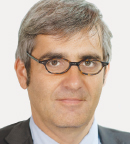DISCUSSANT ZSOFIA KINGA STADLER, MD, of Memorial Sloan Kettering Cancer Center, found the nivolumab (Opdivo)/ipilimumab (Yervoy) combination results very encouraging but was also impressed with the monotherapy arm. Both approaches are significant advances in treatment, she said.

Zsofia Kinga Stadler, MD
“The treatment of DNA mismatch repair–deficient/microsatellite instability–high (dMMR/ MSI-high) colorectal cancer has been revolutionized by immunotherapy. Just in the past 2 years, two different anti–PD-1 [programmed cell death protein 1] inhibitors—pembrolizumab (Keytruda) and nivolumab—have received accelerated U.S. Food and Drug Administration (FDA) approval. Pembrolizumab is also approved for patients with dMMR/MSI-high solid tumors that have progressed following prior treatment and with no other satisfactory treatment options. This accelerated approval marks the first time the FDA has approved a cancer treatment based on a common biomarker rather than where the tumor originated,” Dr. Stadler noted.
The findings with nivolumab monotherapy are in line with outcomes observed with pembrolizumab, she said, “suggesting both drugs are reasonable therapy for metastatic dMMR/MSI-H metastatic colorectal cancer.” Complete responses in colorectal cancer were achieved by 9% with nivolumab and 12% with pembrolizumab.1 Acknowledging the limitations of cross-study comparisons, Dr. Stadler noted that the time to response with nivolumab was 12 weeks vs 21 weeks with pembrolizumab in the study by Le et al.1
Notable Findings From CheckMate-142
DR. STADLER highlighted that in CheckMate-142, an additional five patients achieved a complete response with longer follow-up, resulting in an overall complete response rate of 9% with nivolumab monotherapy. Most of these patients had originally achieved a partial response but, “with longer follow-up, ultimately achieved complete remission,” she explained.
“Also notable is that progression of disease remained stable, at 21 months of follow-up, at roughly 30%. in fact, only one patient progressed in the 8 months of additional follow-up,” she pointed out. She further noted the stable disease rate is still 30%, with disease control remaining at an impressive 62% after 21 months’ median follow-up.
Regarding outcomes by prior therapy, she said, “while higher numerical values for response and disease control rates were seen in the less heavily pretreated subgroup, these differences were not statistically significant. The take-home message is heavily pretreated and less heavily pretreated patients both have clinical benefit from this therapy,” she concluded.
Cautious Optimism
LONGER FOLLOW-UP for both nivolumab and pembrolizumab monotherapies will be important, since the response duration and overall survival are not mature for either drug, noted Dr. Stadler. Also, she noted the importance of the assessment of these drugs in the first-line setting, as is underway in KEYNOTE -177.
Regarding the nivolumab/ipilimumab combination, Dr. Stadler called the 55% response rate and 80% disease control rate “very impressive” and observed the results are numerically higher than the 31% response rate seen with monotherapy. However, she cautioned, this is a nonrandomized phase II study that was not designed to formally compare combination vs single-agent therapy.
“Is this sufficient evidence that the combination is superior to monotherapy? No,” she maintained. “This study was not intended for comparison or to show superiority. Both approaches yield extremely durable responses…. We still don’t know if the high response rate seen in the combination arm will translate into meaningful progression-free and overall survival benefits in the long term and whether there will be an advantage over monotherapy. Randomized studies are needed to assess this.”
“Moreover, combination therapy has substantial additional toxicity and further studies to identify subgroups of patients who may benefit from such combination treatment are needed,” Dr. Stadler said. ■
DISCLOSURE: A member of Dr. Stadler’s immediate family has served as a consultant or advisor for Adverum Biotechnologies, Allergan, Genentech/Roche, Optos, and Regeneron.
REFERENCE


